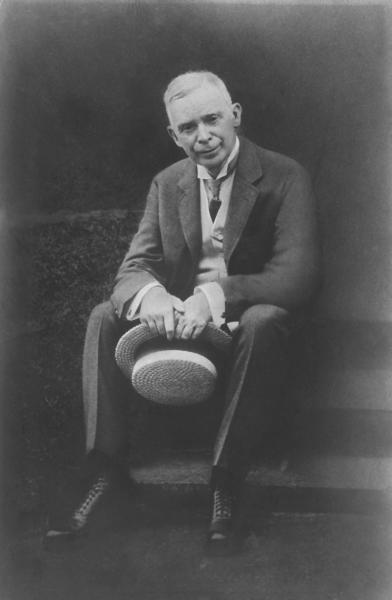Last month Mark Bauerlein peeked into the padded cell of the contemporary university English Dept. His article, in The Chronicle of Higher Education, took a look at exactly what gets taught in first-year English classes…
The fundamentals of the tradition (Shakespeare, Milton, Romantic poets, modernist poets) are missing [from the basic introductory English courses in universities], and so are the fundamentals of literary reading (prosody, rhetoric, figurative language, structure, genre, etc.) Here we see the internal destruction of English as a field. […] Unlike other disciplines, English no longer distinguishes degrees of difficulty and significance. It turns an introductory course into something else — a hasty acquaintance with complex ideas such as différance [Derrida], a quick indoctrination in complex identity matters, a hip involvement with edgy novels — and most students who receive it, I would guess, discern the decadence of the enterprise.
I’ve noted in passing the strange insularity that this vanguardist approach seems to have caused in the Gothic Studies wing of English Literature. Wilum Pugmire wrassled a few days ago with the crude Invasion of the Body Snatchers-style pointing-and-screaming about race, which sometimes results from such courses…
I am searching this book of 468 pages [Lovecraft Remembered], which is made up mostly of memoirs of H.P. Lovecraft by people who knew him as personal friend or correspondent, for mention of his racism. I am grown tired of this new dreary fixation of commentary on Lovecraft that identifies him primarily as a racist writer. I find such emphasis misguided to the point of perversity. Lovecraft’s racism was grotesque and ignorant, and it echoes indeed throughout his fiction; but there is much more to Lovecraft’s genius that is far more vital and interesting. This new school of judgmental critics, who emphasis first and foremost that Lovecraft was racist, and then follow this up to explain why he was “a good bad writer,” shews the absurdity and ineffectiveness of much [mainstream academic] modern Lovecraft critique, critique that reveals far more ignorance regarding Lovecraft and his work than anything else.
In defence of mainstream academia, there is a steady flow of sound dissertations and theses each year (though only sometimes from straight Eng Lit departments, and then usually from outside America). And now a small crop of Lovecraft course module-documents are available online, mostly for one-semester courses being taught mostly in American universities. I occasionally come across these course documents while searching the Web, and they seem encouraging. Most seem well designed and at least minimally aware of the historical context (if only the context of the genre’s tradition). Though I’d imagine that more than a few of these are the products of enthusiastic hourly-paid visitor or adjunct lecturers, rather than cautious faculty. How well they play in the classroom I have no idea. I guess they encounter people lacking in a historical framework and fundamentally unequipped in actual techniques of doing in-depth historical scholarship, something that seems to me implicitly required to adequately study the political dimensions of historical texts and authors. If a student or even their teacher has no idea of the actual historical structures and trajectories of the racial categories and regrettable racisms of Lovecraft’s time, then the default politically-acceptable ‘year zero’ approach will be the only one available to them.
Seems to me that this is part of a wider erasure of history from the study and understanding of creativity — something evidenced by the shrinkage or closure of art history depts, and an increasing ‘the history doesn’t matter much’ approach in other departments teaching creative students. That’s bound to have a snowball effect, as graduates of these courses move up the career chain, being less likely to value the history side of teaching because they lack a real grounding in it themselves. And management doesn’t push history, because the students don’t like being asked to do historical essays and forcing them to do it increases the student drop-out and failure-rate in the department. The rise of joint Masters degrees (History and English, etc) may help somewhat, but some radical bunker-busting among the disciplines would probably be needed to help such courses make a useful combined impact on a student in the nine months available to a one-year Masters course.
These various factors make it highly unlikely that a young mainstream academic of today will invest the time and expense needed to even begin to become a fair Lovecraft scholar (several years of close reading, of books and journals that could cost $2,000 or more to amass). In a system dominated by career advancement and management strictures, mainstream academics tend to need ‘quick wins’ that ‘tick the boxes’ and add ‘impact’ to the key assessments on which departmental funding depends.
These and other barriers seem destined to further bifurcate the field into: i) long-standing independent Lovecraft scholars and philosophers, operating mostly outside the academy, and ii) mainstream academic ‘dabblers’ who dip into Lovecraft either to make a quick buck for their publisher or to make their slim young C.V. a little more hip — but who consequently get basic things wrong and thus are chuckled at and ignored or scourged by the Lovecraftians. That said, I recognise that I started as a ‘dabbler’ myself, and know that — if one keeps at it — then it can lead to better things.
What is to be done? In the age of the virtual classroom, video lectures and Skype, one wonders… could Lovecraft scholars start a self-funding online ‘Lovecraft University 101’ summer school, for say six weeks or so each year? Perhaps with the aid of the likes of the turn-key infrastructure on offer at Coursera or Udacity or edX. I’ll contribute a headmaster’s mortar-board for Robert Price.














